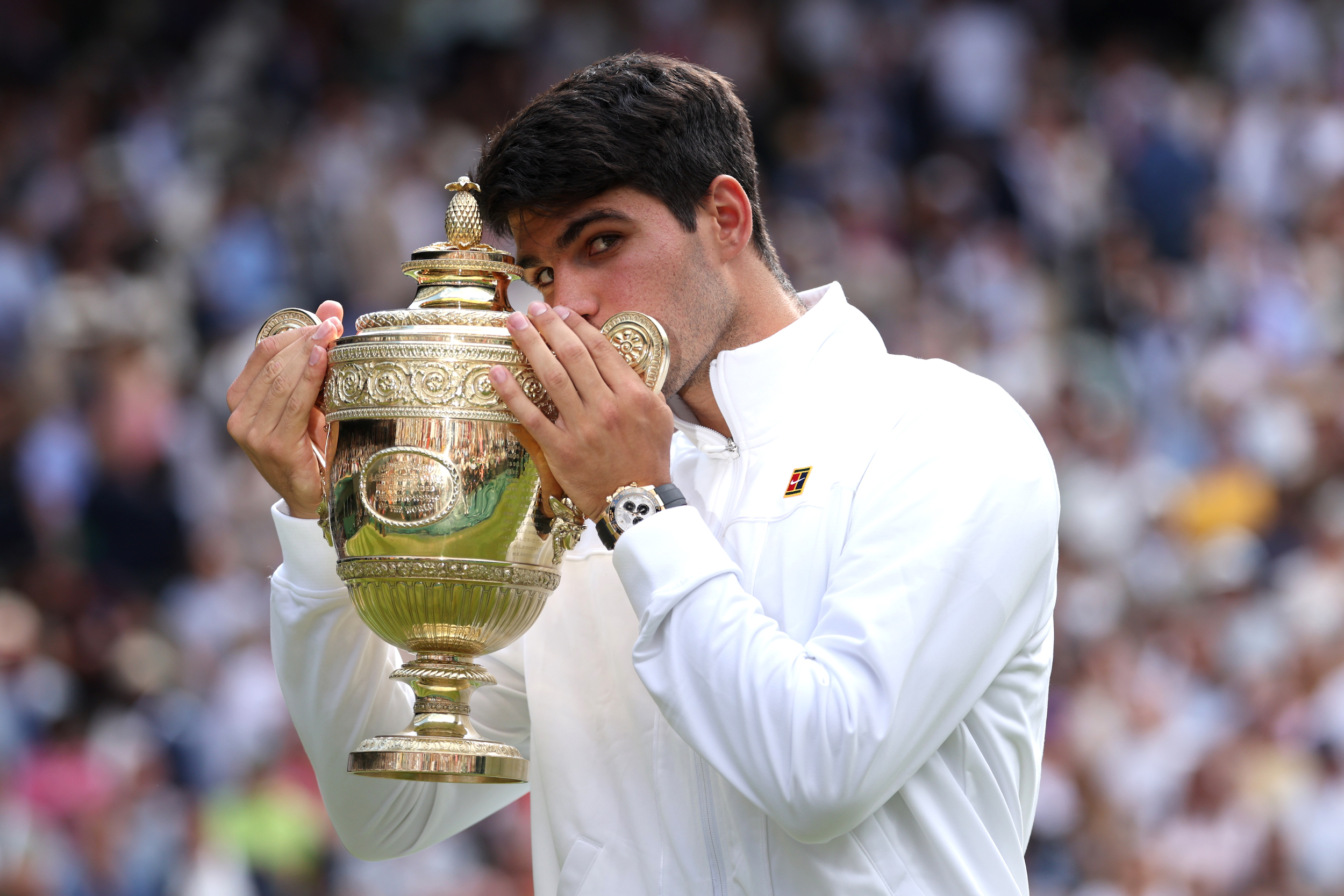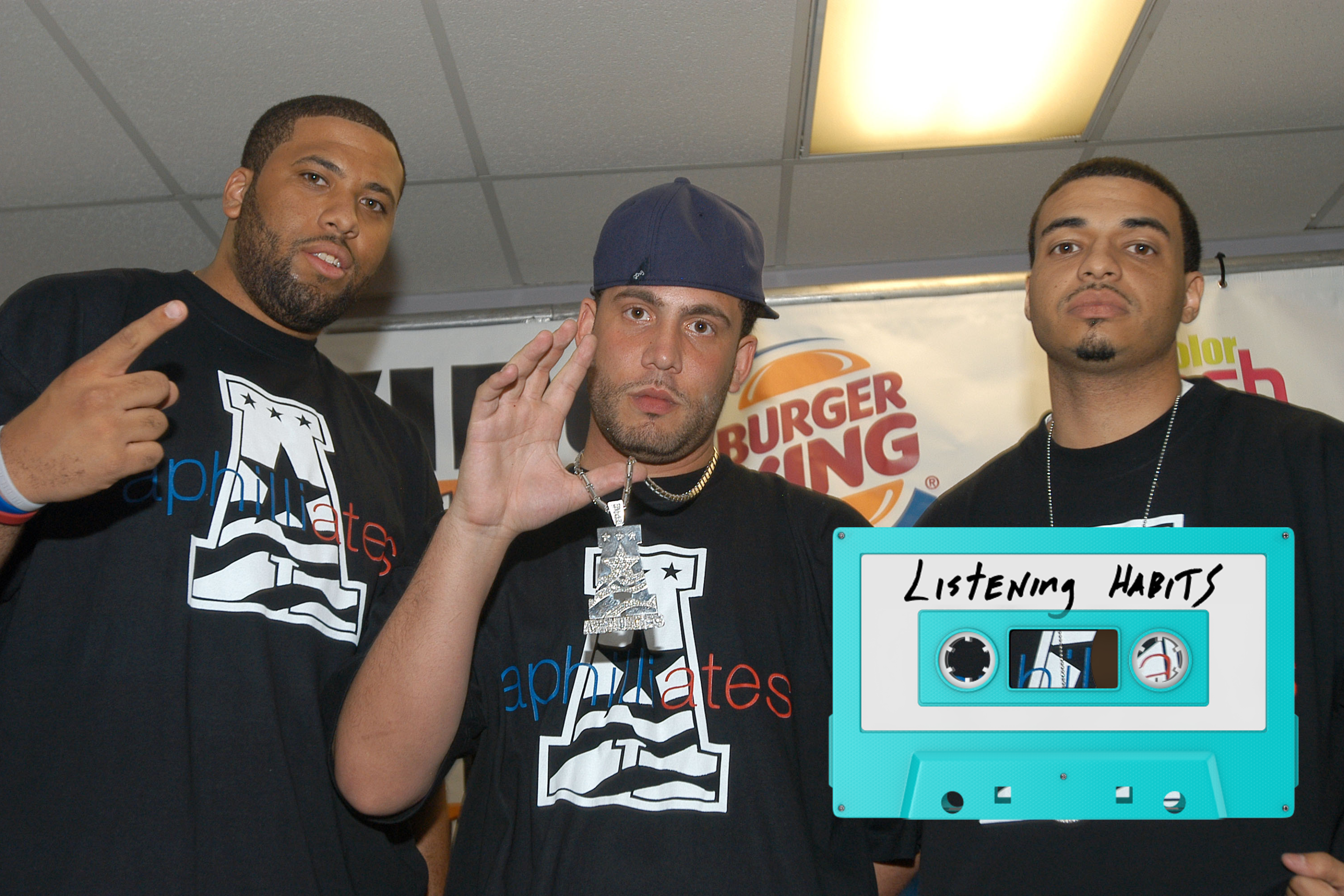It lands as a joke now, but two Wimbledon trophies ago, it would've been fair to describe Carlos Alcaraz as an inexperienced and unproven grass-court tennis player. In June 2023 he was still talking about how "tiring" it was to move on grass, how every step demanded additional focus, and how he watched videos of Andy Murray and Roger Federer to figure out how they moved so well. Two weeks ago I asked Alcaraz, now 21 and entering Wimbledon as its defending champ, if he'd watched any other players to add something new to his grass game. First he said he wasn't thinking of anyone else, before he allowed that he was watching Roger and Andy and Rafa and Novak—a dull, safe reply. Then he tacked on a concession that could only sound charming coming from him.
"And I put on videos of myself last year—I'm not gonna lie—just to see what I did, or how I did it," Alcaraz said, smiling wide enough to devour the world. Why go elsewhere for knowledge? Look inward. Plato, in one of his looser moods, theorized that people have immortal souls, which are full of knowledge accrued from past lives, so learning is actually just rediscovering that forgotten knowledge buried inside. How quickly we've arrived at this new juncture, where there isn't much else for Carlos Alcaraz to learn from other people, where he is writing the futures of tennis by himself, expanding its possibilities with every half-volley and high-pressure triumph.
After defeating seven-time Wimbledon champion Novak Djokovic in a 6-2, 6-2, 7-6(4) rematch that teetered into high drama only in its waning minutes, Alcaraz is now the third-youngest man ever to win four major titles. Last month in Paris, he became the youngest man ever to win a major title on hard court, clay, and grass. Now he's one of just six men who have won Roland-Garros and Wimbledon back to back, alongside Rod Laver, Bjorn Borg, and the modern Big Three. Despite changes in court surface and increased time between those tournaments, pulling off the "Channel Slam" still demands versatility in movement and tactics, plus a fresh kind of physical endurance. Winning seven best-of-five tennis matches is an entirely different physical proposition than it was in 1962. Perhaps more jarring than any of these historical milestones is the subjective experience of watching Alcaraz and realizing that he can claim major titles without finding his best tennis for long passages of play, as he did in Paris, or that he's widened the gap between him and a historically great rival so decisively that he can snuff them out in a two-hour, 27-minute major final, as he did Sunday in London.
For context, this wasn't the same Djokovic that Alcaraz saw in the 2023 final. Last year, Djokovic was assembling one of his most dominant seasons to date, eventually making four major finals and winning three, stiff-arming his younger rivals at a comfortable distance. This Sunday's Djokovic was 37 years old, winding down a dismal first half of a season. This still included an Australian Open semifinal and a Roland-Garros quarterfinal, but winning no titles of any kind by July qualifies as an anomalous disappointment for Djokovic, and in the spring he canned much of his staff and skipped some big events.
Then there were the physical concerns. Djokovic had surgery on his right knee to repair a meniscus tear suffered in a fourth-round match at Roland-Garros, and rehabilitated the injury right up to the start of Wimbledon, leaving him no time to play a warmup tournament on grass. He said he would not play the tournament unless he thought it was possible to win the title, and he made that judgment. With no match reps, but with a little assistance from a soft draw and a quarterfinal walkover, Djokovic in a gray knee sleeve was still good enough to slide into the final with minimal resistance.
That's a testament to how far removed Djokovic is from the rest of the field on grass—and, in turn, how far removed Alcaraz is from him. There are no more Kevin Andersons and Matteo Berrettinis to be dispatched without fuss. Now Djokovic is clattering against another all-timer, 16 years his junior, and learning how hard it is to keep up with someone as talented as himself.
Alcaraz arrived on court playing his most clear-eyed and fine-tuned tennis of the summer. To the extent that there is any real critique of Alcaraz's tennis right now, it's lapses in concentration. In the micro, that might lead him to attempt a demented drop shot off an easy overhead smash, fail, and fling his head between his forearms in humiliation, as he did in his semifinal against Daniil Medvedev; in the macro, it might lead him to throw away a sloppy set here or there, as he did throughout the tournament. (Fortunately for him, he remains unconquerable in five-setters.) But Alcaraz did not dawdle at all on Sunday, breaking Djokovic's serve in the first game of the match, then breaking again. He ran up a two-set lead before Djokovic had fully acclimated himself to the conditions of the fight. Usually, coach Juan Carlos Ferrero needs to use soothing body language and hand gestures to corral his fiendishly talented charge into playing less spectacularly and more efficiently. So focused was Alcaraz that early in the third set, he was talking sternly to his player's box, pointing at them and then himself, asking them to focus more on him.
Alcaraz, in full flow, was playing almost unnecessarily well. He'd have Djokovic on the run and nearly beaten, but decide to slot his backhand down the line into a thin channel of open space, just to wrongfoot him. He banged big first serves and followed them with untouchable drop shots, condensing into two shots the force-finesse mix that is his stamp on the modern game. He loved to drop shot, and was himself undroppable, with the speed to track everything down. It was tennis of unrelenting novelty and precision, and through two sets, it was not being met in kind. It was a washout, not the kind of contest that last year's final would have led anyone to expect.
Djokovic, assessing his own limited movement and Alcaraz's ability to make him scramble in any direction on any given ball, decided early that he had little chance in the baseline exchanges, and forced himself to net. But he struggled to volley the vicious barrage directed at his face, at his toes, and past his reach, and wound up converting only 27 of the 53 points played at the net, looking as disoriented in the front court as he has in years. This historically brilliant returner couldn't get traction in his return games, producing just three break points in the match. Djokovic said afterward that this was what shocked him most: "I've never seen him serve that way, to be honest. 136 [mph]. Maybe I was missing something this tournament, but I've never seen him serve that fast."
In the third set, a mildly revitalized Djokovic managed to keep the set level until he stepped up to serve at 4-4, only for Alcaraz to produce his most spectacular sequence of the match. First was a point of unflagging pace and depth. A deep return, deep backhand down the line, deep forehand winner—Alcaraz's head level as the force of his stroke hurled him into the air, his aim lethal enough that Djokovic didn't bother moving to the ball—0-15. Next it was a return that kicked off the baseline, followed up by a juicy midcourt forehand—0-30. Then Djokovic lined up a serve-and-volley, seemingly picture-perfect, only for Alcaraz to defend the sideline with a swinging volley from no-man's-land, a shot nobody teaches, pure funk and audacity, clearing away all danger with a flat swipe—0-40. Two points later, Alcaraz sent a backhand pass hissing past Djokovic, and it was his time to serve for the match. The seven-time champion barely set in his chair on the changeover. He took a quick sip of water and walked to the other side well before the umpire called time, and stood there, lightly chuckling to himself.
Alcaraz was tasked with serving out the championship, and he had the benefit of new balls, which move faster through the air. Despite running up a 40-0 lead in the game, the kid flinched. A double-fault, then a good Djokovic return. The kind of floaty putaway he'd make 999 out of 1,000 times, but sent wide, maybe in part because a fan screamed out while the ball was in the air. Alcaraz lost the game, and intrigue crept back into the match for roughly 15 minutes, only for him to squash it again with a confident tiebreak.
This time, Alcaraz didn't collapse on the ground after the last point; he just threw up his arms, smiled, bared his teeth, and hollered. His parents, who were teary last month in Paris, had conspicuously drier eyes this time around. After the young champion arrived in his box, he was once again absorbed into the huddle of jubilant men, but it wasn't as raucous as it was when this caliber of win was still a novelty. Even his victory speeches in English are starting to settle more into the canned rhythms. He and the people around him are getting used to the familiarity of these victories, and with good reason, because there are so many more to come.
After the match, in the usual shows of humility, Alcaraz said he was still working to make his name, to someday sit alongside "those guys who are eating at the big table," referring to the sport's winningest champions. Nobody in the men's game is a more complete player across all three surfaces. No player presently ranked in the top-20 has an edge in their head-to-head matchup. He has taken control of his matchup against Djokovic, an intriguing if time-constained rivalry that will be settled only when the older man retires. His chief contemporary Jannik Sinner, who lost in the quarterfinal, remains the No. 1 men's player in the world on paper. But Alcaraz is the back-to-back major champ headed into the Paris Olympics, played on the clay where he just won the title at Roland-Garros. Whatever there is to win in tennis will be his, in time.






